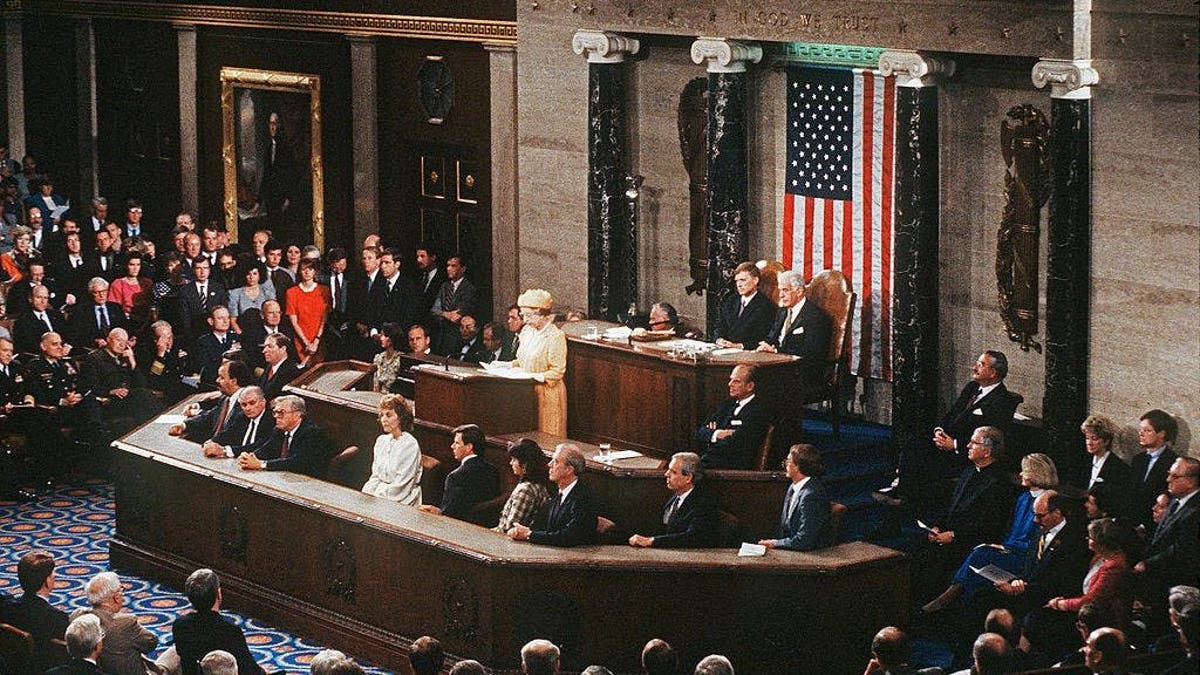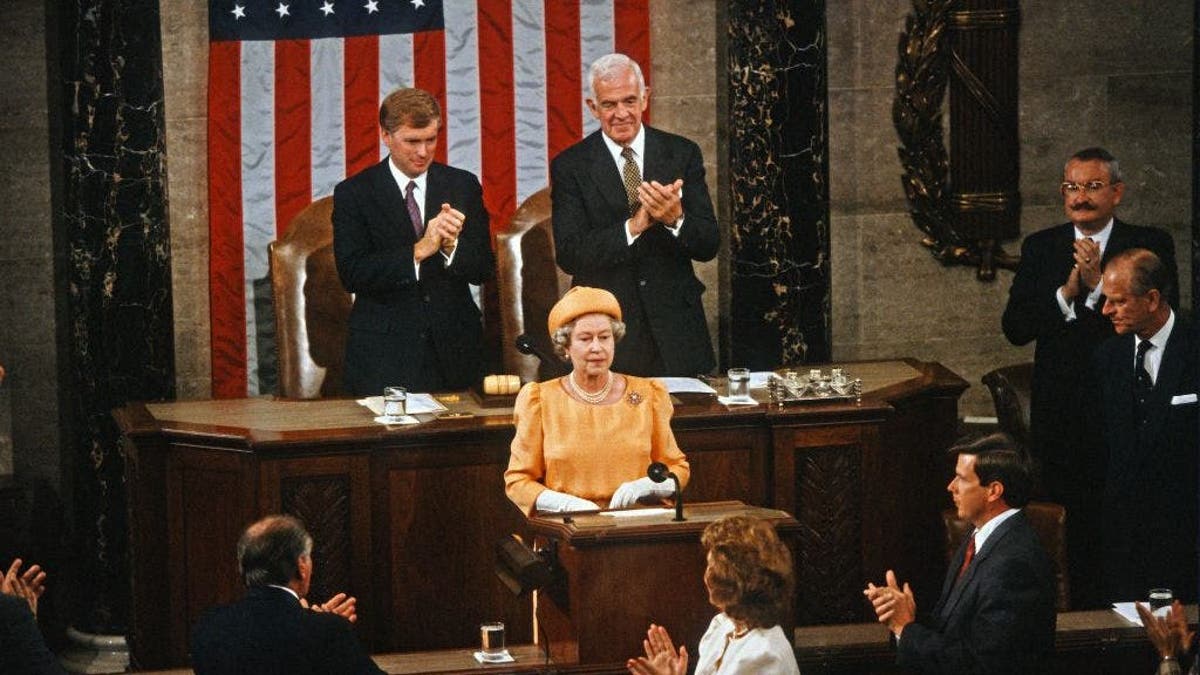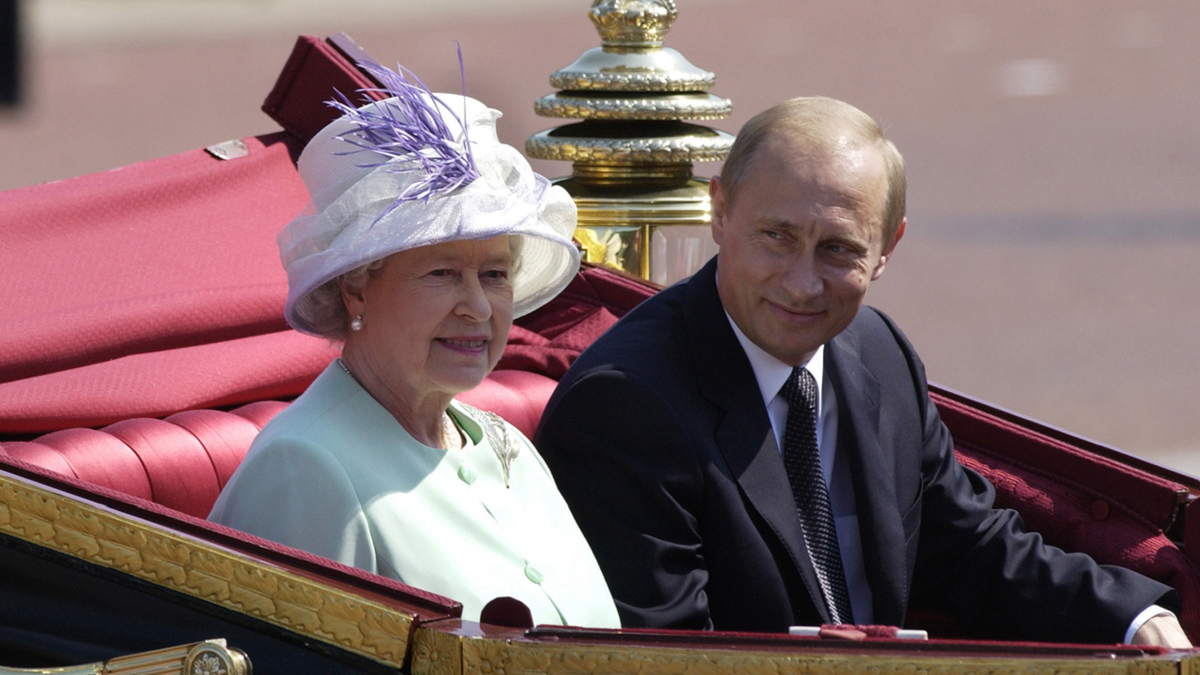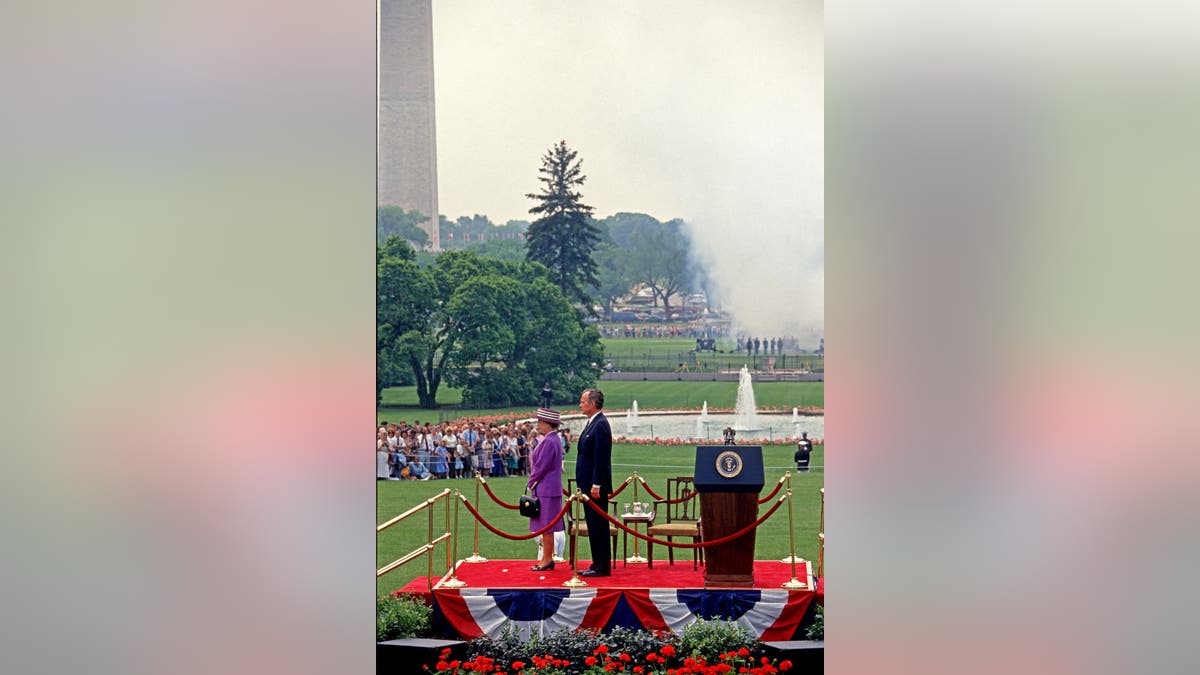Queen Elizabeth II's impact on the United States
Fox News host Bret Baier reflects on Queen Elizabeth II's life and legacy on 'The Story with Martha MacCallum.'
"I do hope you can see me from where you are," Queen Elizabeth II deadpanned before a packed House chamber.
House and Senate members had squeezed into the room to hear the queen speak before a joint meeting of Congress. They first roared with laughter at the queen’s dry wit. They then stood to give the queen a standing ovation.
Lawmakers from both sides certainly saw Elizabeth that day — May 16, 1991. They saw her peach dress, peach hat and pearls.
After all, the queen spoke to Congress on the very dais in the House chamber where presidents deliver their State of the Union remarks to lawmakers each year — complete with late House Speaker Tom Foley, D-Wash., and former Vice President Dan Quayle looming behind her.

Queen Elizabeth II addresses a joint session of Congress in the House Chamber in May 1991 in Washington, D.C. (Anwar Hussein/Getty Images)
With Prince Phillip at her side, everyone in America’s legislative branch could hear — and see — the queen atop the House rostrum.
That was not the case the day before at the White House.
A battery of microphones and a towering lectern embossed with the presidential seal shrouded the 5-foot-4 queen when she spoke next to then-President George H.W. Bush. Commentators characterized the speech as the "talking hat." All people could see on TV was the queen’s triple-striped, brimmed hat — her eyes barely visible above the microphones.
But the queen’s wicked sense of humor resonated in the halls of Capitol Hill as she became the first British monarch to address a joint meeting of Congress a day later.
Late British Prime Minister Winston Churchill spoke to a joint meeting of Congress in 1941.
PHOTOS: QUEEN ELIZABETH THROUGH THE YEARS
"Your Congress and our Parliament are the twin pillars of our civilizations and chief of many treasures we have inherited from our predecessors," the queen told lawmakers. "A significant part of your social contract is based on custom as well. But the spirit is the same. It is the spirit of democracy. But these ideas must never be taken for granted. They must be nurtured through fluctuation and change."
But the queen’s address to Congress wasn’t without controversy. Former Rep. Joseph Kennedy, II, D-Mass., and other lawmakers boycotted the address. Kennedy protested what he characterized as the British "occupation" of Northern Ireland.
The queen arrived in Washington just months after Bush, former British Prime Minister John Major and other world leaders assembled a massive, international coalition to stare down Iraqi dictator Saddam Hussein and kick his forces out of Kuwait during the Gulf War.

Queen Elizabeth II addresses a joint session of Congress in the House Chamber at the U.S. Capitol in Washington, D.C., May 16, 1991. (Anwar Hussein/Getty Images)
"The best progress is made when Europeans and Americans act in concert," the queen said during the joint meeting. "I know the servicemen and women of Britain and all the members of the coalition were proud to act in a cause alongside their American comrades."
The maneuvering to assemble the international partnership to stand against Iraq was extraordinary. Not since World War II had the international community rallied in such fashion.
The queen knew something about conflict and standing up to the forces of evil.
QUEEN ELIZABETH II BECOMES WORLD'S SECOND-LONGEST REIGNING MONARCH OF ALL TIME
Elizabeth’s first public speech was a little like her remarks at the White House in 1991. People could hear her. They just couldn’t see her. A 14-year-old Princess Elizabeth spoke on the BBC radio’s "Children’s Hour" in 1940 as the German Luftwaffe and the Royal Air Force battled in the skies during the Battle of Britain. A Royal Air Force victory eventually deterred Germany from invading the United Kingdom.
Elizabeth’s remarks on that broadcast were an effort to calm British children and commiserate about the upheaval of war.
"Thousands of you in this country have had to leave your homes and be separated from your fathers and mothers. My sister Margaret Rose and I feel so much for you as we know from experience what it means to be away from those we love most of all," the future queen said. "To you, living in new surroundings, we send a message of true sympathy and, at the same time, we would like to thank the kind people who have welcomed you to their homes in the country."

Russian President Vladimir Putin is accompanied by Queen Elizabeth II during his state visit June 24, 2003, in London. (Julian Herbert/Getty Images)
Elizabeth closed with this:
"And when peace comes, remember it will be for us, the children of today, to make the world of tomorrow a better and happier place."
The queen ascended to the throne in a period that may have been a little happier. But the globe quickly descended into the Cold War — which was still ongoing, but waning — when Elizabeth spoke to Congress in 1991.
BIDEN TO ATTEND FUNERAL OF QUEEN ELIZABETH II
"The world was still coming out of the shadow of the Second World War and during a bold, uncertain, uncharted future," Senate Majority Leader Chuck Schumer, D-N.Y., said on the floor just after Elizabeth died. "Her reign saw the dawn of the atomic age. The age of the internet. The fall of the Soviet Union. An unprecedented global pandemic. She didn't just witness the great turns of history. She helped shape them."
Schumer characterized the queen as "a rock," adding, "I daresay we will never see a leader quite like her for as long as we live."
House Speaker Nancy Pelosi, D-Calif., ordered flags at the Capitol lowered to half-staff shortly after the queen died.

Queen Elizabeth II (left) and U.S. President George H.W. Bush (1925-2018) stand together as the former is welcomed on the White House South Lawn during a state visit May 14, 1991. (Arnie Sachs/CNP/Getty Images)
During an event in San Francisco, Pelosi spoke of how her father — the late Baltimore Mayor and Rep. Thomas D'Alesandro, Jr., D-Md. — attended the queen’s coronation when he was in London with the U.S. Conference of Mayors.
Pelosi said she attended a garden party at the residence of the British ambassador to Washington when the queen visited in 2007. Pelosi said she confided in the queen that her father was present when she took the throne.
Pelosi recounted when the queen came inside at the end of the party, "she said only one thing. ‘The speaker’s father was at my coronation.’"
Pelosi confided that she had never before told that story.
CLICK HERE TO GET THE FOX NEWS APP
"Their loss is our loss," Sen. Jim Risch, R-Idaho, said of the queen’s passing. "She’s led the country though very difficult times. And, of course, in a monarchy like that, like all of us, they have family issues. And she guided the family through difficult times."
Senate Minority Leader Mitch McConnell, R-Ky., said the queen was of "sterling character."
"The queen made sure her reign was never really about herself. Not about her fame. Or her feelings. Or her personal wants or needs," said McConnell.
The House of Representatives meets Tuesday for the first time since early August. Pelosi’s office says the House will adopt a bereavement resolution and later adjourn for the day in Queen Elizabeth's honor.














































